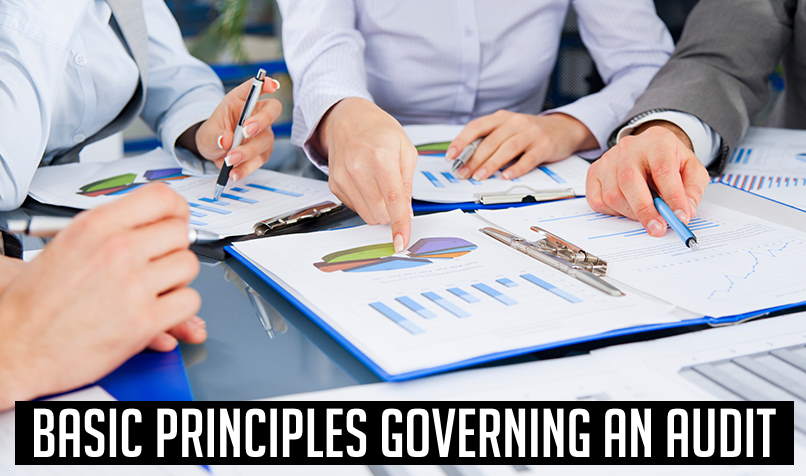Basic Principles Governing an Audit
Table of Contents
Principles Governing an Audit
Auditing and Assurance standards give the basic principles an auditor has to follow while conducting an audit of financial statements of any organization.

1. Integrity Objectivity and Independence
Any professional should be straightforward, honest and sincere in his approach. An auditor is a professional who is given access to entire financial records of the organization he is auditing. He is also entrusted with funds of other persons for the purpose of audit. So, he should show a high standard of integrity and maintain a separate account for the amount entrusted to him. His opinions should be based on evidences rather than on personal intuitions. People in the organization should not doubt his independence.
2. Confidentiality
The auditor should maintain a strict confidence of the information acquired in the course of audit. The information should not be disclosed to a third party. If there is a legal or professional duty to disclose certain information, he may do so with specific authority. The auditor should not use the information for his personal gains or for the advantage of the third party.
3. Skill and Competence
The auditor requires specialized skill and competence to perform his audit work. The audit report has to be prepared with due care. As the professionally qualified persons act as auditors, their specialized knowledge, skills and competence acquired through study and formal course help them perform flawlessly. The auditor also needs to constantly update his skill and competence in the field of accounting and auditing. Skill and competence acquired by the auditor should be applied with due care.
4. Work Performed by Others
An auditor can delegate work to assistants or use the work performed by others. While delegating work, he should give proper directions to perform the work. He should also supervise and review the work appropriately.
An auditor may have to rely on the work and report of another auditor. Then he should ensure the adequacy of the nature and purpose of the work. He can rely on the opinion or work of an expert with due caution.
5. Documentation
Adequate documentation serves as an evidence of the audit performed. It will support the fact that the audit was carried out in accordance with basic principles. Maintenance of working papers is useful in planning, performance, supervision and review of audit. Therefore, the auditor is required to document matters in support of the audit work performed by him.
6. Planning
Proper planning enables the auditor to conduct an effective audit in an efficient and timely manner. Plans should be made to cover, among other things
- acquiring knowledge of the clients’ accounting system, policies, and internal control procedures.
- establishing the expected degree of reliance to be placed on internal control.
- determining and programming the nature, timing and extent of the audit procedures to be performed, and
- co-ordinating the work to be performed. Plans should be revised depending upon the audit needs.
7. Audit Evidence
The auditor before expressing his opinion on the financial statements, conducts tests and applies audit techniques to collect evidence. By evaluating the evidences collected, he draws conclusions about the financial statements.
The auditor applies compliance procedures to evaluate the effectiveness of the internal control. To find out the accuracy and validity of the transactions, he tests the details of the transactions and analyses the ratios and trends of the expenses and income over the period. These procedures are called substantive procedures, Thus, audit evidences are of two types:
- tests of details of transactions and balances and
- analysis of ratios and trends including the enquiry of unusual fluctuations and items.
8. Accounting System and Internal Control
Depending upon the size and nature of business, the management should maintain an adequate accounting system incorporating appropriate internal controls. The audit techniques to be adopted and the extent of substantive procedures to be followed depend on the reliability of the internal control system.
The reliability of the internal control system depends on its effectiveness, Therefore, it is the duty of the auditor to evaluate the effectiveness of internal controls regarding accounting system. The auditor is able to identify the possible areas of material misstatements.
9. Audit Conclusions and Reporting
Conclusions are drawn from the audit evidence collected and from his knowledge of the business of the entity. The auditor should review and assess the conclusions so drawn.
The auditor gives his opinion in the from of audit report. The form or content of the report should comply with requirements as prescribed under any agreement or relevant statutory requirements.
The audit report is of three types namely, unqualified report, qualified report and adverse report. If the auditor is satisfied about the following, he gives an unqualified report.
- The financial statements are prepared with generally accepted accounting principles.
- The accounting policies are consistently followed.
- All the material matters are adequately disclosed as required by law.
If the auditor is not satisfied with any of the above and finds minor deviations from the above requirements, he may give a qualified report. If the deviations are material and if they adversely affect financial statements, he may give an adverse report.
If the information made available and the explanation given to him were not adequate to form any conclusion he may disclaim from giving any opinion.
